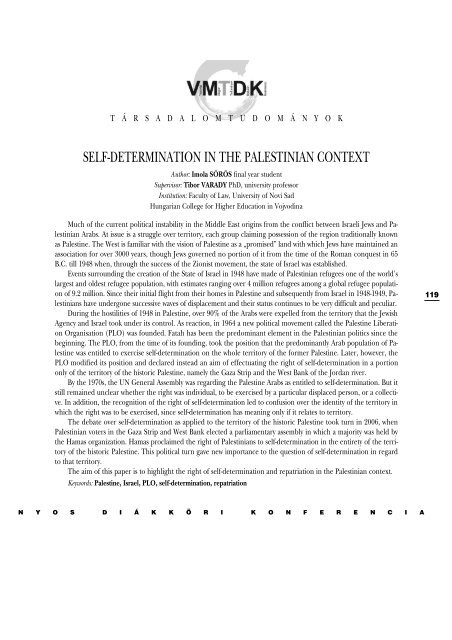Rezümékötet 2008. - vmtdk
Rezümékötet 2008. - vmtdk
Rezümékötet 2008. - vmtdk
Create successful ePaper yourself
Turn your PDF publications into a flip-book with our unique Google optimized e-Paper software.
T Á R S A D A L O M T U D O M Á N Y O K<br />
SELF-DETERMINATION IN THE PALESTINIAN CONTEXT<br />
Author: Imola SÖRÖS final year student<br />
Supervisor: Tibor VARADY PhD, university professor<br />
Institution: Faculty of Law, University of Novi Sad<br />
Hungarian College for Higher Education in Vojvodina<br />
Much of the current political instability in the Middle East origins from the conflict between Israeli Jews and Palestinian<br />
Arabs. At issue is a struggle over territory, each group claiming possession of the region traditionally known<br />
as Palestine. The West is familiar with the vision of Palestine as a „promised” land with which Jews have maintained an<br />
association for over 3000 years, though Jews governed no portion of it from the time of the Roman conquest in 65<br />
B.C. till 1948 when, through the success of the Zionist movement, the state of Israel was established.<br />
Events surrounding the creation of the State of Israel in 1948 have made of Palestinian refugees one of the world’s<br />
largest and oldest refugee population, with estimates ranging over 4 million refugees among a global refugee population<br />
of 9.2 million. Since their initial flight from their homes in Palestine and subsequently from Israel in 1948-1949, Palestinians<br />
have undergone successive waves of displacement and their status continues to be very difficult and peculiar.<br />
During the hostilities of 1948 in Palestine, over 90% of the Arabs were expelled from the territory that the Jewish<br />
Agency and Israel took under its control. As reaction, in 1964 a new political movement called the Palestine Liberation<br />
Organisation (PLO) was founded. Fatah has been the predominant element in the Palestinian politics since the<br />
beginning. The PLO, from the time of its founding, took the position that the predominantly Arab population of Palestine<br />
was entitled to exercise self-determination on the whole territory of the former Palestine. Later, however, the<br />
PLO modified its position and declared instead an aim of effectuating the right of self-determination in a portion<br />
only of the territory of the historic Palestine, namely the Gaza Strip and the West Bank of the Jordan river.<br />
By the 1970s, the UN General Assembly was regarding the Palestine Arabs as entitled to self-determination. But it<br />
still remained unclear whether the right was individual, to be exercised by a particular displaced person, or a collective.<br />
In addition, the recognition of the right of self-determination led to confusion over the identity of the territory in<br />
which the right was to be exercised, since self-determination has meaning only if it relates to territory.<br />
The debate over self-determination as applied to the territory of the historic Palestine took turn in 2006, when<br />
Palestinian voters in the Gaza Strip and West Bank elected a parliamentary assembly in which a majority was held by<br />
the Hamas organization. Hamas proclaimed the right of Palestinians to self-determination in the entirety of the territory<br />
of the historic Palestine. This political turn gave new importance to the question of self-determination in regard<br />
to that territory.<br />
The aim of this paper is to highlight the right of self-determination and repatriation in the Palestinian context.<br />
Keywords: Palestine, Israel, PLO, self-determination, repatriation<br />
N Y O S D I Á K K Ö R I K O N F E R E N C I A<br />
119




